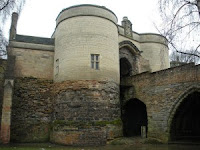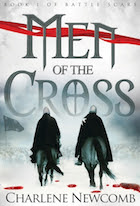by Charlene Newcomb
Gerard de Camville
(or de Canville) was Sheriff of Lincolnshire various times during the reigns of
Richard I (1189-1199) and John (1199-1216). De Camville was born circa 1132-35.
Little is known of his early life. He was the son of Alice and Richard de
Camville. Richard had faithfully served Kings Stephen and Henry II. He held
lands in Normandy, and had acquired lands in Northamptonshire, Leicestershire, Oxfordshire,
Warwickshire, Essex, and Somerset through grants from the kings and through
marriage. Richard was trusted by Henry to accompany his daughter Joanna for her
wedding to William II of Sicily.
Gerard de Camville
comes into the records more prominently upon his father’s death in Sicily in
1176. Like his father, Gerard appears to have had the good fortune of being in
Henry II’s favor. Gerard married the wealthy widow Nichola de la Haye before
1185.
 |
| Lincoln Castle |
Through her father,
Nichola was the hereditary castellan of Lincoln, and upon their marriage,
Gerard acquired that office as well as that of Sheriff of Lincolnshire. When
Richard I became King of England, Nichola and Gerard journeyed to Normandy to
confirm her inheritance. However, appointment as castellans often came at a
price. Richard I sold the offices to raise money for the Third Crusade. Gerard
and Nicola received the official charter confirming Nicola’s rightful inheritance
and Gerard as Sheriff for 700 marks in 1189. (On an interesting side note, William Marshal offered fifty marks for the
Gloucestershire shrievalty and castle.)
While Gerard remained
in England, his younger half-brother – also a Richard - was one of three men
charged with overseeing King Richard’s fleet during the Third Crusade. When 700
men from King Richard’s fleet were arrested after a night of wild, unlawful
behavior in Lisbon in 1190, Richard de Camville had to treat with the King of
Portugal for their release so their vessels could rendezvous with King Richard
in Marseilles. (They were late; Richard hired other busses and left without
them!) Following the fleet’s winter stay in Messina, Gerard’s brother became a
joint governor of Cyprus, but later joined the King at Acre and died of illness
there.
 |
| Jew's House, Lincoln |
Gerard
was impacted in other ways by the call to Crusade and King Richard’s absence. Lincoln
was home to one of the most important Jewish communities in England. Religious
fervor stirred outright violence against Jews throughout the country, culminating
in the massacre at York in March 1190. Jews were murdered in Lynn (Norfolk) and
Stamford, and crowds in Lincoln were incited. With Lincoln’s Bishop, Hugh of Avalon,
Gerard provided a refuge for Lincoln’s Jews in the Castle.
Gerard should have
been set: lands and estates inherited from his father; his wife’s inheritance;
and that nice, cushy job at one of the most formidable castles in England. But with
King Richard off at war, the king’s chancellor, William Longchamp, sowed seeds
of discontent among the barons. Longchamp removed one sheriff after another and
placed his own friends and relatives in positions of authority. When he
demanded that Gerard relinquish Lincoln Castle, Gerard did homage to Count
John, the king’s brother. Chronicler Richard
of Devizes claims that Gerard was “a factious man and reckless of allegiance”
who helped John occupy Nottingham and Tickhill. Meanwhile, back in Lincoln, Devizes
writes that Gerard’s wife Nichola “proposing to herself nothing effeminate,
defended [Lincoln] Castle like a man” against a 40 day siege by Longchamp’s
forces. Gerard’s shrievalty was affirmed after John and Longchamp met in July
1191 to arrange a truce.
Gerard appears to have
no decisive role in the rebellion of 1193 when Count John conspired with King
Philip of France to overthrow the absent King Richard. John and Philip offered
silver to the Holy Roman Emperor to hold Richard in custody in Germany; Philip
helped pay Flemish mercenaries to invade England on John’s behalf. John had
ordered all his castles to be defended against the king’s men.
Golding does note
that Gerard supported John, but there appears to have been no action at Lincoln
in 1193 even after Queen Eleanor ordered sieges against John’s castles. Perhaps
Gerard, who had been granted the honour of Wallingford, was involved in sieges
there during this time though my research on that matter does not turn up his name.
 |
| Nottingham Castle (circa 1250) |
King Richard’s return
from captivity in 1194 and Richard’s decisions at the subsequent Council of
Nottingham in late March/early April ended de Camville’s position as Sheriff of
Lincolnshire and castellan of Lincoln Castle. Like many others, Gerard de
Camville’s support for John cost him all his lands and titles. Richard, aware
of the need to raise monies to support his war against Philip of France, did
restore Gerard’s lands upon payment of 2,000 marks.
When John succeeded
Richard as king in 1199, Gerard was rewarded for his loyalty. He was named
castellan of Lincoln Castle once again and appointed Sheriff of Lincolnshire. His
name appears infrequently in the historical records for the years 1194 – 1215,
including the years 1199 – 1205 while he served as Sheriff. He was present when
William, King of Scots, appeared before King John in Lincoln in 1200 and was
involved in a marshland dispute. Well past his 70th year, he was
collecting revenues and serving as an itinerant justice.
Gerard de Camville
died in 1215. His exact date of death is not known. There is no evidence
showing his awareness of the English barons’ discontent with King John and
Magna Carta. However, Gerard’s wife Nicola stood by the king, and within months
of John's death, she once again defended Lincoln Castle against the French.
Sources
Devizes,
R. The Chronicle of Richard of Devizes
concerning the deeds of Richard the First, King of England. (1841). Trans,
and ed. By J.A. Giles. London: James Bohn.
Golding, B. (2006) “Canville , Gerard de (d. 1214).” Brian Golding In Oxford Dictionary of National Biography, edited by H. C. G. Matthew and Brian Harrison. Oxford: OUP, 2004. Online ed., edited by Lawrence Goldman. http://www.oxforddnb.com/view/article/4543.
Golding, B. (2006) “Canville , Gerard de (d. 1214).” Brian Golding In Oxford Dictionary of National Biography, edited by H. C. G. Matthew and Brian Harrison. Oxford: OUP, 2004. Online ed., edited by Lawrence Goldman. http://www.oxforddnb.com/view/article/4543.
Heiser, R.R. (2000).
"Castles, Constables, and Politics in Late Twelfth-Century English Governance.”
Albion: A Quarterly
Journal Concerned with British Studies, Vol. 32, No. 1 (Spring, 2000), pp.
19-36
Miller, D. (2003) Richard the Lionheart: the Mighty Crusader.
London:
Weidenfeld & Nicolson.
Newburgh,
W. “William of Newburgh.” Trans. & ed. by Paul Halsall, 2000. Internet Medieval Source Book. Book 4
http://legacy.fordham.edu/halsall/basis/williamofnewburgh-four.asp
Newcomb,
C. (2014) “In Search of Facts…For My Fiction.” The Many Worlds of Char http://charlenenewcomb.com/2014/06/01/in-search-ofthe-facts/
Roberts, M.
“Lincoln.” http://www.jtrails.org.uk/trails/lincoln/history
Turner,
R.V. (2009). King John: England’s Evil King. Stroud, Gloucestershire: The
History Press.
Vincent.
N. (2004) ‘Canville , Richard de (d. 1191)’, Oxford Dictionary of
National Biography, Oxford University Press
[http://www.oxforddnb.com/view/article/47247]
Images
Lincoln Castle "Lincoln Castle Entrance" by Uday R Nair - Own work. Licensed under CC BY-SA 3.0 via Wikimedia Commons
Jew’s House By Marek69 [GFDL (http://www.gnu.org/copyleft/fdl.html) or CC BY-SA
4.0-3.0-2.5-2.0-1.0
(http://creativecommons.org/licenses/by-sa/4.0-3.0-2.5-2.0-1.0)], via WikimediaCommons
Nottingham Castle by kstatelibrarian (i.e., me). CC BY-SA 4.0 via FLICKR
* * * * * * * * * * *
Charlene Newcomb is the author of Men of the Cross,
Book I of Battle Scars. This historical adventure, set during the Third
Crusade, is a tale of war’s impact on a young knight serving Richard the
Lionheart and of forbidden love. Book II, For King and Country, will be
published in 2016.
Visit Charlene’s website, http://charlenenewcomb.com,
On Facebook at CharleneNewcombAuthor
On Twitter @charnewcomb.
Visit Charlene’s website, http://charlenenewcomb.com,
On Facebook at CharleneNewcombAuthor
On Twitter @charnewcomb.
Book link: Amazon


This provides valuable insight into a character usually treated as a caricature of evil. Well done, Char.
ReplyDeleteForgot to add, I rather like his wife Nicola!
ReplyDeleteI agree! She is one impressive woman.
DeleteSeems to be a typical nobleman of his times, even compassionate. The "people" are railing against the Jews -- for no legitimate reason -- and he offers them protection.
ReplyDeleteAll things considered, a fair man.